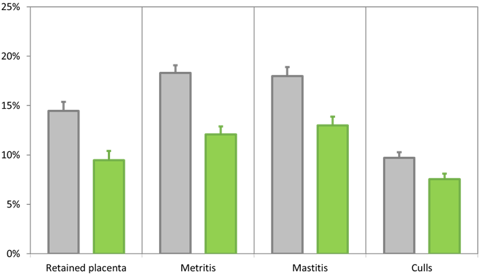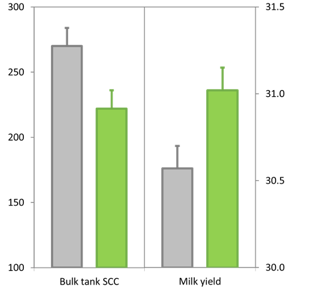The use of antibiotics in animal production is under increasing pressure in many world regions, particularly Europe. So, there is a growing interest coming from the animal production sector and society at large in alternative management and nutritional strategies that support animal health and performance. One example is OmniGen AF®, a complementary feed product from Phibro Animal Health.
Original article published in Allevatori Top n.9 Nov20 page 130-132.
The immune system is key to maintain cow health and productivity. The immune system is comprised of a network of immune cells, including neutrophils. Neutrophils are first responders to infections, tasked with the function to eliminate invading pathogens to protect the cow from mastitis, metritis and other infectious diseases. The immune function is subject to suppression and stimulation, and stress is one of the conditions compromising immune function. Cows respond to stress by releasing cortisol, and neutrophils are particularly sensitive to cortisol, losing functionality and leaving the cow more susceptible to infectious agents (Burton et al., 2005). Calving and drying-off are two examples of stressful periods but stressors can unexpectedly arise at any time during the production cycle including extreme weather, feed contaminants, crowding, pen moves, diet deficiencies, etc.
OmniGen AF is designed to help maintain healthy immune function in dairy cattle. More than fifteen years of university and field research have shown that when OmniGen AF is fed to ruminants, significant improvements can be detected in the neutrophils’ ability to function normally in the presence of stress (Ortiz-Marty et al., 2017) and maintain an effective level of activity over time (Ryman et al., 2013; Nace et al.,2014), resulting in opportunities for better health and production in all phases of the lactation cycle.
To demonstrate the value OmniGen AF provides when used in conjunction with sound dry and lactating cow nutrition and management practices ‘The Immunity Challenge’ program was introduced by Phibro Animal Health to European dairy producers in 2015. The objective of the program is to evaluate the benefits of feeding OmniGen AF on farm health and productivity records in practical field conditions. A summary of results collected for all farms enrolled from the start of the of this project in 2015 till late 2019 was presented in the last annual meeting of the American Dairy science association last summer (Garcia-Gonzalez et al, 2020).
244 dairy farms from Belgium, France, Italy, the Netherlands and United Kingdom were enrolled across all seasons of the year. In every farm data was collected for a period of 120 to 180 d prior to feeding OmniGen AF, followed by a consecutive period of the same duration during feeding OmniGen AF to the whole herd. The duration of the program on each farm was dependent mostly on farm size, with longer periods in smaller farms to increase number of health events occurring in the period.
Metrics recorded included: cases of mastitis (available in 156 farms, n=156), retained placenta (n=150), metritis (n=131), and culled cows (n=68); milk yield (n=210) and bulk tank SCC (n=224). Incidence of mastitis and culled cows was expressed as % total herd cows, while incidence of retained placenta and metritis as % fresh cows. Farm per period was the statistical unit, the data was analyzed using a paired t-test, and statistical significance was declared when P<0.05.
Average farm size was 165 cows per farm and the average duration of the program was 146 days across farms. During this period, the average incidence of mastitis, retained placentas and metritis all decreased (P=0.001) during the OmniGen AF vs. prior period (Figure 1): 28% fewer cases of mastitis (13.0% vs. 18.0%), 34% fewer retained placentas (9.5% vs. 14.5%) and 34% fewer metritis (12.1% vs. 18.3%). The number of involuntarily culled cows, recorded in 68 farms, also decreased by 22% (Figure 1).

Figure 1. Average incidence of health events before (grey bars) and during OmniGen AF feeding (green bars) in 244 European dairies. * P=0.001.
Results for milk quality and yield are depicted in Figure 2: bulk tank SCC decreased (P=0.001) an average of -48,000 cells/ml (222,000 vs. 270,000 cells/ml) while milk yield slightly increased (31.0 vs. 30.6 kg/hd/d).

Figure 2. Average bulk tank SCC and milk yield before (grey bars) and during OmniGen AF feeding (green bars) in 224 European dairies. * P=0.001.
In conclusion, clear improvements were reported in herd health and production from a substantial number of European farms feeding OmniGen AF in practical conditions. These results suggest that OmniGen AF, as part of a sound diet and management program, can help to support cow health and production.
Learn more about what OmniGen AF can do for your herd here or contact us to arrange a farm consult.
Burton, J.L., et al. 2005. Vet. Immunol. Immunop. 105: 197-219
Garcia-Gonzalez, R. et al. 2020. J. Dairy Sci. 103 (Suppl. 1): 287 (abstract)
Nace, E.L., et al. 2014. Vet. Immunol. Immunop. 161: 240-50
Ortiz-Marty, R.J., et al. 2017. J. Dairy Sci. 100: 6422-8
Ryman, V.E., et al. 2013. Res. Vet. Sci. 95: 969-74
Weber, P.S., et al. 2004. J. Leuk. Biol. 75: 815-27
Subscribe to our blog updates and receive new blog articles in your mailbox.
